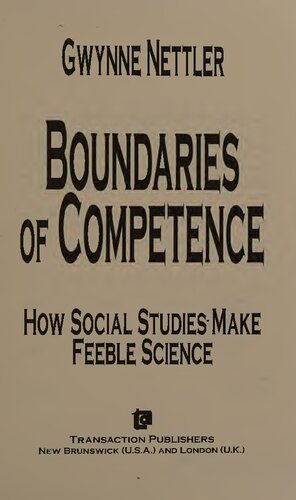

Most ebook files are in PDF format, so you can easily read them using various software such as Foxit Reader or directly on the Google Chrome browser.
Some ebook files are released by publishers in other formats such as .awz, .mobi, .epub, .fb2, etc. You may need to install specific software to read these formats on mobile/PC, such as Calibre.
Please read the tutorial at this link: https://ebookbell.com/faq
We offer FREE conversion to the popular formats you request; however, this may take some time. Therefore, right after payment, please email us, and we will try to provide the service as quickly as possible.
For some exceptional file formats or broken links (if any), please refrain from opening any disputes. Instead, email us first, and we will try to assist within a maximum of 6 hours.
EbookBell Team

0.0
0 reviewsThe term "social science" promises more than its practitioners can deliver: it promises knowledge. This knowledge is to consist of statements of empirical regularities of such quality as will enhance predictive power and inform public and private policy. Boundaries of Competence illuminates obstacles to this aspiration.
Chapter 1 grounds knowledge in perception. Chapter 2 challenges the assumption that ordinary language necessarily describes reality and reveals the mischief words can do. Chapter 3 proposes a continuum of perceiving-conceiving involved in different ways of "knowing" worlds. Chapter 4 lays out requirements of measurement, arguing that assigning numbers to dubious observations gives false assurance that mathematical manipulations necessarily rep- resent events.
Chapter 5 shows how choice of unit affects the correlations we find in our search for causes. Chapter 6 holds that, given deficiencies in knowledge and perhaps because of the way Nature works, we assess probabilities rather than seek certainties. Chapter 7 notes difficulties in counting events that consist of "social facts," which "depend on us," and those that refer to "brute facts," that exist independently of us. Chapter 8 criticizes the practice of employing proxies for observations of what we're talking about. In particular, it demonstrates the error produced by relying on what people say as measure of what they do.
Chapter 9 criticizes ways of explaining conduct by characterizing actors and their acts, and by "understanding" them through empathy. Chapter 10 discusses the important and never-ending quarrel about causation. Chapters 11 and 12 argue that in social affairs, decision is regularly torn between doing what is effective (rational) and doing what is right (moral).
Nettler's writing is crisp, and his argument balanced. He employs research from several disciplines to challenge ideologically driven descriptions of our condition and explanations of our conduct.